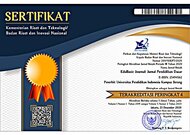Research Enterprise in Covid-19 Times: Establishing the New Normal
Abstract
What impact has the spread of the covid-19 virus had upon research programs in universities? The virus has been resistant to government measures to restrict its spread and the resulting health crisis has led to an economic crisis which is impacting every part of the global economy. Research enterprise has been affected in many ways particularly as research resources have been diverted into medical and strategic crisis response. This paper describes the impact of the pandemic in Australia on research departments of universities and analyses the implications of this impact for researchers and writers. It draws attention to the way research commissions from government departments and grants from research funding bodies are redirecting research funds to covid related projects and away from the tradition pre-covid priorities. Finally, it describes ways that research departments and individual researchers can adjust to the new normal in the research environment
Keywords
Full Text:
PDFReferences
Alon, T., Doepke, M., Olmstead-Rumsey, J., & Tertilt, M. (2020). The impact of Covid-19 on gender equality. CEPR Covid Economics: Vetted and Real-Time Papers, 4, 62–85.
Amano-Patiño, N., Faraglia, E., Giannitsarou, C., & Hasna, Z. (2020a). Who is doing new research in the time of COVID-19? Not the female economists. In S. Galliani & U. Panizza (ed.). Publishing and Measuring Success in Economics, 1(1), 137–142.
Amano-Patiño, N., Faraglia, E., Giannitsarou, C., & Hasna, Z. (2020b). The unequal effects of covid-19 on economists’ research productivity. Cambridge Working Papers in Economics, 2038, 1–12.
Baker, J., & Hunter, F. (2020). Lack of higher education vision will kill universities, says vice-chancellor. The Age, 26 June 2020. [Online].
Baker, J. (2020). China overtakes US to become Australia's leading research partner. The Sydney Morning Herald, 22 July 2020. [Online].
Bapuji, H., de Bakker, F. G. A., Brown, J. A., Higgins, C., Rehbein, K., & Spicer, A. (2020). Business and society research in times of the corona crisis. Business & Society, 59(6), 1067–1078.
Barn, B. (2020). The digitalisation of the university. Wonkhe: British Higher Education Blog, 29 April 2020. [Online].
British Council and Oxford Economics. (2012). The shape of things to come: Higher education global trends and emerging opportunities to 2020. British Council Higher Education Report, 1–72.
Cho, C. H., & Kurpierz, J. (2020). Stretching the public purse: budgetary responses to COVID-19 in Canada. Journal of Public Budgeting, Accounting & Financial Management, 32(5), 771–783.
Cremonini, L., Brennan, J., Lewis, R., & King, R. (2015). Cultures of Quality: An International Perspective: Profiles of Quality Assurance in Higher Education in Nine Countries. (Research Report), (pp. 1-82). The Quality Assurance Agency for Higher Education.
Croucher, G., & Locke, W. (2020). A post-corona virus pandemic world: some possible trends and their implications for Australian higher education. Discussion Paper of the Centre for the Study of Higher Education, the University of Melbourne. (pp. 1–7). Melbourne: the University of Melbourne.
Frederickson, M. (2020). Women are getting less research done than men during this coronavirus pandemic. The Conversation, 27 May 2020. [Online].
Gornitzka, Å., & Stølen, S. (2021). University challenge – The role of research intensive universities in crisis management. In S. Bergan et al. (eds). Higher education’s response to the covid-19 pandemic building a more sustainable and democratic future. Council of Europe Higher Education Series, 25, 107–114.
Grossi, G., Ho, A., & Joyce, P. G. (2020). Budgetary responses to a global pandemic: International experiences and lessons for a sustainable future. Journal of Public Budgeting, Accounting & Financial Management, 32(5), 737–744.
Jalal, N. M., Dewi, E. M. P., Basti, B., & Halima, A. (2020). School well-being analysis of online learning during covid-19 in students and lecturers. Proceeding of The International Conference on Science and Advanced Technology (ICSAT), 5, 958–965.
Marinoni, G., Land, H. V., & Jensen, T. (2020). The Impact of Covid-19 on Higher Education around the World. (IAU Global Survey Report), (pp. 1-50). International Association of Universities.
Mok, K. H., Xiong, W., Ke, G., & Cheung, J. O. W. (2021). Impact of COVID-19 pandemic on international higher education and student mobility: Student perspectives from mainland China and Hong Kong. International Journal of Educational Research, 105(101718), 1–11.
Onyema, E. M., Eucheria, N. C., Obafemi, F. A., Sen, S., Atonye, F. G., Sharma, A., & Alsayed, A. O. (2020). Impact of coronavirus on education. Journal of Education and Practice, 11(13), 108–121.
Rinaldi, L., Cho, C. H., Lodhia, S. K., Michelon, G., & Tilt, C. A. (2020). Accounting in times of the covid-19 pandemic: a forum for academic research. Accounting Forum, 44(3), 180–183.
Salim, H., & Waterworth, P. G. (2015). Colleagueship and professionalism in inter-institutional cooperation: international collaboration in research. Surindra Journal of Local Development, 8(1), 67–86.
Svanholm, A. G. (2020). The impact of COVID-19 on study abroad: April 2020 survey results. Educations Media Group. 24 April 2020. [Online].
Watermeyer, R., Crick, T., Knight, C., & Goodall, J. (2020). COVID-19 and digital disruption in UK universities: Afflictions and affordances of emergency online migration. Higher Education, 81, 623–641.
DOI: https://doi.org/10.17509/ebj.v3i1.33465
Refbacks
- There are currently no refbacks.
Copyright (c) 2021 Universitas Pendidikan Indonesia
This work is licensed under a Creative Commons Attribution 4.0 International License.
This journal is indexed by




.png)




.png)
1.png)


1.png)

.png)